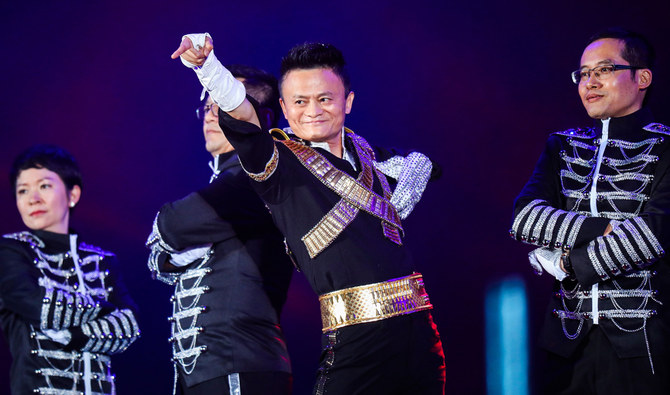SHANGHAI: Jack Ma steps down next week as chairman of Alibaba, but the start-up he built into an online retail behemoth is expected to keep thriving into a new era thanks to a culture of innovation he helped nurture.
A former English teacher whose often playful image shattered the stereotype of the drab Chinese executive, Ma officially leaves on Tuesday, his 55th birthday.
Ma plans to put his vast fortune — among China’s biggest at $41 billion — into initiatives serving his first love, education, following the footsteps of a fellow tech innovator he admires: Bill Gates.
The departure of charismatic founders from big tech companies typically causes hand-wringing and wobbling share prices, but not at Alibaba.
The company’s operational reins have for a couple of years now been in the hands of a respected team of executives who have kept it on e-commerce’s cutting-edge.
Ma was Alibaba’s driving force and a frequently irreverent ambassador for the company, known for stunts like a Michael Jackson-inspired dance at an Alibaba anniversary celebration two years ago and starring in his own kung fu short film.
He is expected to retain some advisory functions.
But the transition to figures like CEO Daniel Zhang, and co-founder and executive vice chairman Joseph Tsai — announced exactly a year ago — may prove to be the “gold standard” for tech-company succession, said Jeffrey Towson, an equity investor and professor at Peking University.
“He’s succeeded at what Steve Jobs, Bill Gates and (Yahoo co-founder) Jerry Yang failed at, which is making themselves redundant,” said Towson, who has authored books on China’s leading companies.
“He built a really robust culture at Alibaba and they are still just innovating like crazy.”
Ma was a cash-strapped Chinese entrepreneur when he convinced friends to give him $60,000 to start Alibaba in the eastern city of Hangzhou in 1999.
With monthly active users of more than 750 million today, Alibaba helped to unlock China’s massive consumer power, coincidentally a key objective of the government today as its seeks to fuel domestic demand to lessen the reliance on fickle foreign trade.
Its Taobao and Tmall platforms have helped countless businesses grow.
“(Ma) has been the driving force for the development of China’s Internet industry and economy. He is (China’s) entrepreneurial godfather,” said furniture maker Cheng Huaibao.
Cheng, 30, is one of millions of small businessmen, often located in so-called “Taobao villages” — communities whose economies are oriented toward Alibaba’s vast market — who leapt into commerce thanks to the company.
Cheng started making bunk beds in 2010 in eastern Jiangsu province with 10 staff. Today his thriving operation has 100 employees.
“Without Teacher Ma, I wouldn’t have come out and started my own business,” Cheng said, using a common Chinese term of respect.
There have been criticisms.
Alibaba and its imitators are accused of fostering rampant commercialism and materialism and the selling of counterfeit goods.
Chinese e-commerce today also produces mountains of packaging material, contributing to a rising national garbage problem.
And some of Ma’s comments have drawn barbs, including recently dismissing concerns that Chinese workers were toiling excessive hours, as did the news last year that he was a Chinese Communist Party member.
But Alibaba has continued to expand its ecosystem, pushing into cloud computing, entertainment, and a “new retail” concept — combining online ordering with bricks-and-mortar stores — while its Alipay finance unit has pioneered cashless digital payments.
Despite slowing Chinese economic growth and the US trade war, earnings have so far remained strong.
Ma, who has established an eponymous charitable organization, already has launched a range of education initiatives.
Last month he sketched out his mantra going forward during a technology debate in Shanghai with Elon Musk, good-naturedly chiding the US entrepreneur about his obsession with putting a man on Mars.
“We need a hero like you, but we need more heroes like us improving things on Earth,” Ma said.
Smooth succession: Jack Ma eases out of a thriving Alibaba
Smooth succession: Jack Ma eases out of a thriving Alibaba

- Ma officially leaves on Tuesday, his 55th birthday
Oil, gas markets surge amid Strait of Hormuz disruptions, Saudi intercepts drones at Ras Tanura

JEDDAH: Oil prices surged by as much as 13 percent on March 2 after retaliatory Iranian attacks disrupted shipping in the Strait of Hormuz, following Israeli and US strikes on Iranian military sites.
Brent crude futures rose to as much as $82.37 a barrel, the highest since January 2025, before easing to trade up $5.73, or 7.86 percent, at $78.60 by 9:42 a.m. GMT.
US West Texas Intermediate crude climbed to an intraday high of $75.33, up over 12 percent and the highest since June, though it later pared gains and was up $4.82, or 7.19 percent, at $71.84.
Both benchmarks jumped as a sustained exchange of counterattacks damaged tankers and sharply disrupted shipments in the Strait of Hormuz, a waterway between Iran and Oman that connects the Gulf to the Arabian Sea.
On a typical day, tankers carrying oil equal to about one-fifth of global demand pass through the Strait from Saudi Arabia, the UAE, and Iraq, as well as Iran and Kuwait. The waterway also handles diesel, jet fuel and gasoline shipments bound for major Asian markets such as China and India, Reuters reported.
“Markets are acknowledging the seriousness of the conflict, but are also signaling that, for now, this is a geopolitical shock, not a systemic crisis," Reuters quoted Priyanka Sachdeva, senior analyst at Phillip Nova, as saying.
The International Energy Agency is in touch with major producers in the Middle East, director Fatih Birol said on March 1. The energy watchdog coordinates the release of strategic petroleum reserves from developed countries during emergencies.
Globally, visible oil inventories stood at 7.83 billion barrels, enough for 74 days of demand, which is near a historical median, according to Goldman Sachs.
Citi expects Brent to trade between $80 and $90 a barrel this week amid the ongoing conflict. It also warned that if the region’s oil infrastructure were attacked, prices could rise to $120 a barrel, with the likelihood of this scenario estimated at 20 percent.
"Our baseline view is that the conflict could de-escalate within one to two weeks if the Iranian leadership changes or the US decides to step back after achieving its objectives against Iran’s missiles and nuclear program," Citi analysts led by Max Layton wrote.
Saudi intercepts drones near Ras Tanura refinery
Amid a widening wave of Iranian drone and missile strikes on Gulf countries following Tehran’s retaliation for US‑Israeli attacks, the Kingdom said on March 2 it intercepted and destroyed two drones that attempted to strike the Ras Tanura refinery, according to an official statement.
A senior official at the Ministry of Energy said that on March 2, the Ras Tanura oil refinery sustained minor damage from debris caused by the interception of the drones near the facility, according to the Saudi Press Agency, or SPA.
The official added that the incident resulted in a small fire that was promptly handled by emergency teams, emphasizing that no injuries or fatalities were reported.
“Some operational units at the refinery were temporarily shut down as a precaution, but supplies of crude oil and petroleum products to local markets were not affected,” SPA reported, citing the official.
Gas markets face heightened risk
European natural gas prices could more than double if shipments through the Strait of Hormuz were halted for a month, Goldman Sachs said.
Analysts at Goldman Sachs wrote in a note dated March 1 that indicators in Europe and Asia have barely priced in the risk premiums associated with Iran.
Around one-fifth of the world’s liquefied natural gas, mostly from Qatar, passes through this strait, and a one-month disruption could push European gas prices and spot LNG in Asia up by 130 percent, to $25 per million British thermal units, they said.
Egypt redirects gas and electricity supplies
Egypt has halted the supply of about 100 million cubic feet of natural gas per day to Syria and Lebanon via the “Arab Gas Pipeline,” following a suspension of supplies it receives from Israel’s Tamar and Leviathan fields in the eastern Mediterranean, according to a government official who spoke to Asharq on condition of anonymity.
The official said Cairo redirected volumes received through the regasification vessel Energeos Force, docked at Jordan’s port of Aqaba, to meet domestic demand and supply Jordan.
The move follows Israel’s suspension of about 1.1 billion cubic feet per day to Egypt and 300 million cubic feet to Jordan.
Egypt had previously agreed with Syria and Lebanon to regasify shipments for their benefit through its infrastructure, supplying 100 million cubic feet per day during the winter months.
Under the arrangement, Syria was to deliver 50 million cubic feet of this gas to Lebanon from its northern fields. These arrangements have now been frozen due to the current supply shortage.
Under the latest developments, Cairo is currently receiving about 300 million cubic feet per day from the Aqaba unit, while Amman receives a similar volume to operate its power plants, compensating for the absence of Israeli gas.
Egypt has increased its electricity exports to Jordan by about 29 percent, raising the supply to 225 megawatts instead of 175 MW, to help stabilize the Kingdom’s power system amid current regional developments, according to a government official who spoke to Asharq.
The official clarified that the increase in exported capacity will not affect domestic needs or loads, according to the assessment of the readiness of the national electricity grid.














